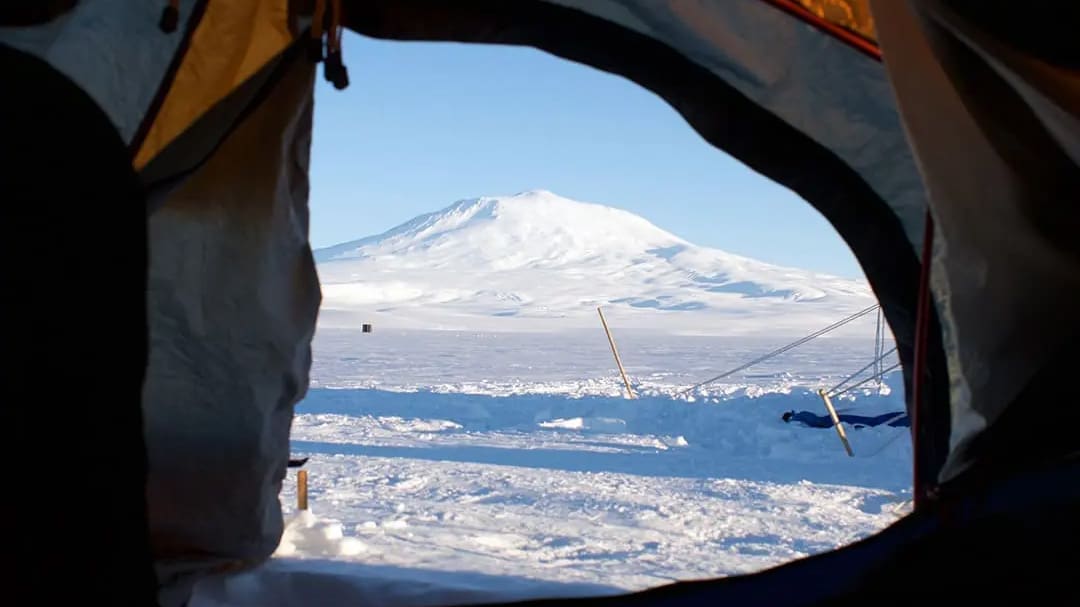15 Souls
Oct 28, 2016
Dr. Gordon Hamilton died in a crevasse accident last week. Gordon was 50 years old. He worked as a climate scientist at the University of Maine for many years and became a fixture of the McMurdo community. We put the busy life of the station on “pause” for a simple, joyous memorial service. Members of his team offered remembrances and others read portions of the New York Times article about his work. According to Gordon’s wishes, this was not a religious ceremony, however there was no doubting the deep presence of that which resonates between all human souls.
Gordon was born in Scotland. His pride in all things Scottish was famous at McMurdo. So, I found a fiddle and a crane operator who plays guitar and we played Scottish fiddle tunes before and after the ceremony. We also played during the distribution of a little GlenMorangie Scotch for everyone. The room was alive with stories after the service and I am willing to bet that Gordon’s life will continue to color many of the conversations here for a long time. Though we shared only a couple days together at the station, I have come to know him better through his colleagues.
A couple days after Gordon’s death, my 15-member team made camp and slept on the ice for what is called the “Deep Field Shakedown.” This was the culmination of a week’s worth of training that included safety/survival protocols, crevasse rescue training and much more. The shakedown allowed us to check our gear and our skills before heading out to a more remote place for a longer duration. We tested our sleeping bags, multiple sets of gloves, cooking equipment, etc. We made snow anchors to hold our tents down. We learned how to find our way through a white out if the weather should turn bad. We completed tasks one at a time. Each one built upon the last. Living in extreme environments like this doesn’t lend itself to our American obsession with multi-tasking. There were no emails or tweets to check. There was no constant drone of presidential campaign news or Facebook posts to fill up the tiny gaps of time in our busy day. The only thing that mattered was the safety of each team member. While the -28 F temperature was not at all comfortable, I found this single minded teamwork a welcome respite from the culture of distraction back home.

In addition to the best gear and training in the world, McMurdo has an extensive communication network that monitors the movement of all its members. Teams that leave the station must check in with the station at a strict, predetermined schedule to ensure that if an accident happens, help can be on the way soon. Each time we called, we repeated that we had “15 souls, all doing well.” The operations center replied, “Confirmed 15 souls, all doing well.”

After making camp, we had some dinner and good conversation. Michael, a veteran of this sort of work, spoke of the special beauty we will find at our location on the Ross Ice Shelf next week. Whereas our shake down camp had magnificent views of mountains and the active volcano, Mt. Erebus, our camp on the shelf will have a completely level horizon. Every direction will look identical. On misty days, the ice will melt into the sky with no way to see the border. He said in his plain, matter-of-fact tone, “Every time you come here, you leave a little piece of your soul behind.” Michael is right. After only a week and one night out in the cold, I can feel the ice chipping away at little bits of my soul.
This year marks the centennial of Ernest Shackleton’s famous rescue of his crew after his attempt to be the first to cross Antarctica was halted by the sea ice. After over 2 years of enduring the cold, hunger, and uncertainty, against all odds, Shackleton brought every member of crew home alive. He wrote, “We had seen God in His splendors, heard the text that Nature renders. We had reached the naked soul of man.” The ice places an immediate and relentless demand on every visitor to shed the frills of life back home. The ice demands our complete attention. The ice draws us closer to our souls.
Gordon Hamilton gave much more than parts of his soul to Antarctica. He gave his life to researching the increasingly urgent effects of climate change. His friends and teammates at McMurdo were witness to his dedication to the hard and dangerous work of caring for our planet. He stands in a long line of explorers, scientists, and artists who left parts of their soul here.

